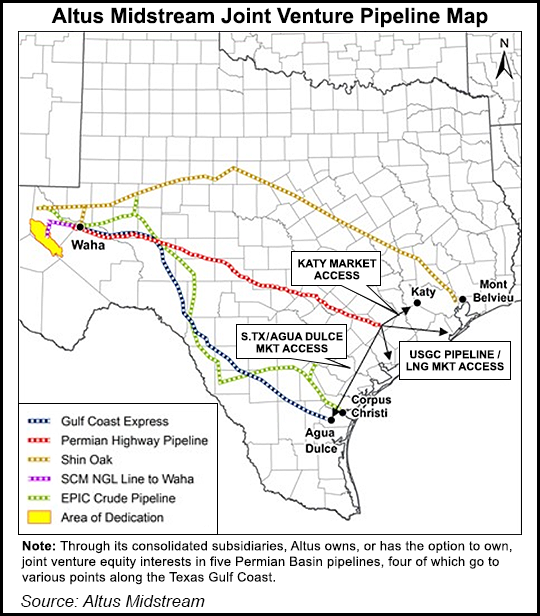NGI The Weekly Gas Market Report | Infrastructure | M&A | NGI All News Access
Altus Acquires Stakes in Permian Highway Natural Gas Pipeline
Houston-based Altus Midstream Co., which owns most of the assets servicing Apache Corp.’s Alpine High in the Permian Basin, has exercised an option to acquire a 26.7% stake in the 2 Bcf/d Permian Highway Pipeline (PHP), which when completed could deliver natural gas from West Texas to the Gulf Coast.

The 42-inch diameter pipeline last September was given the all-clear by Kinder Morgan Texas Pipeline LLC (KMTP) and EagleClaw Midstream Ventures LLC. The final investment decision (FID) to advance PHP, unveiled last June, could put the pipeline in service by late 2020.
PHP would move gas through a 430-mile pipeline from Waha to Katy, west of Houston, with connections to the Gulf Coast and Mexico markets.
“We are very excited to participate in the Permian Highway Pipeline,” Altus Midstream CEO Clay Bretches said on Thursday. “This is a high-quality project supported by take-or-pay contracts with creditworthy counterparties.”
Shippers already committed to the project besides EagleClaw include Apache and XTO Energy Inc., a subsidiary of ExxonMobil Corp.
Net to the Altus ownership interest, the exercise price of the option is about $161 million, Bretchese said, which includes the proportional share of capital spent by the JV partners.
“Exercising the PHP option in advance of the September deadline minimizes this financing charge, which reduces our capital requirements by approximately $8 million relative to what was included in our 2019 guidance,” he noted.
The ownership split on the estimated $2.1 billion long-haul pipeline now is 26.7% each by Altus Midstream Processing, KMTP and EagleClaw, with the remaining 20% owned by an anchor shipper affiliate.
Altus, a pure-play, Permian-to-Gulf Coast midstream C-corporation, through its consolidated subsidiaries owns most of the gas gathering, processing and transportation assets servicing Apache’s production in the Alpine High in the Delaware sub-basin. Altus also owns or has the option to own JV equity interests in five Permian pipelines, four of which go to various points along the Texas coast.
The current Permian gas pipeline queue of PHP and Gulf Coast Express, set to begin operations this October, “provides only temporary relief for the Waha market as we anticipate 2 Bcf/d of annual residue gas growth resulting in status quo oversupply over the next two years,” Tudor, Pickering, Holt & Co. analysts said Thursday.
“With regional pricing languishing in negative territory and growing industry aversion to flaring, recent upstream commentary suggests increased willingness to commit to takeaway,” with the proposed 2 Bcf/d Whistler Pipeline Project “potentially the next project to see positive FID.”
© 2024 Natural Gas Intelligence. All rights reserved.
ISSN © 1532-1231 | ISSN © 2577-9877 | ISSN © 1532-1266 |
